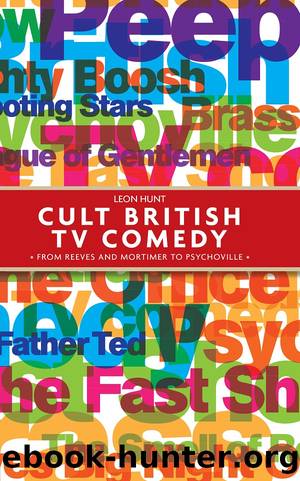Cult british TV comedy by Leon Hunt

Author:Leon Hunt [Hunt, Leon]
Language: eng
Format: epub
Tags: Social Science, Popular Culture, Art, Film & Video, Performing Arts, Television, General
ISBN: 9781526102362
Google: l225DwAAQBAJ
Publisher: Manchester University Press
Published: 2015-11-01T03:13:07+00:00
5
Community and intimacy: from laugh track to commentary track
According to Andy Medhurst, âComedy says to us: youâre among friends, relax, join inâ (2007: 19). While proponents of more confrontational or âexperimentalâ forms of comedy might challenge (or at least qualify) this proposition, it seems safe to accept that comedy does require some sense of belonging. The nature of this belonging might vary hugely, along lines determined by nation, class, ethnicity, gender, sexuality and age. It might also vary significantly in size (or imagined size) between the unifying community of mainstream entertainment that Medhurst seems to particularly have in mind, or the more subcultural belonging that âcultâ and âalternativeâ comedy seem to offer. This chapter examines the role of two types of affective relations mediated by sound tracks accompanying TV comedy â recorded laughter and DVD commentaries â that can be seen as helping to position the spectator/listener by means of what Misha Kavka calls âfictions of presenceâ or âvirtual relationsâ (2008: 12). Television, Kavka suggests, is âa technology of intimacy, a machine that functions by drawing viewers closeâ (Ibid.: 5), but TV forms that involve a studio or âcannedâ audience, from quiz to chat show to sitcom, also mobilize a rhetoric of communal belonging and even participation.
Recorded laughter has played a long and important role in broadcast comedy, simulating âlivenessâ, perceived as providing cues for the viewersâ laughter and locating them within an electronic âcommunityâ. While it reinforces nostalgic accounts of âOne Nation TVâ â all of âusâ laughing âtogetherâ â recorded laughter has been contested to some degree from its beginnings as a broadcasting convention (Smith 2005) and seemed in danger of becoming obsolete, in sitcom at least, in recent years. The DVD commentary, on the other hand, offers what Thomas Doherty calls an âimaginary friendshipâ between viewer and artist, not a community but âa new order of intimacyâ (2001: 78). This mediated intimacy takes on particular force in comedy â as a League of Gentlemen fan comments, âitâs like listening to a great private conversation between best friendsâ (quoted by Hunt 2008: 37). If recorded laughter is part of the legacy of broadcast TV, of being positioned within a mass audience, the DVD commentary belongs more to the era of ânew mediaâ and âindividual consumer choice ⦠highly diversified content, atomized reception, and customizable interfacesâ (Kompare 2005: 198). Both impact on the textuality of TV comedy. Recorded laughter or its absence can determine the pacing and performance of comedy, manage expectations around the tone and frequency of jokes. DVD commentaries form an âintratextâ (Brookey and Westerhaus 2002: 25) with the original programme, but the secondary text can sometimes break out of its supplementary role, perhaps most of all in the unruly field of comedy. Sometimes the DVD commentary doesnât know its place and might make us laugh as much as, if not more than, the primary text.
To laugh or not to laugh
Recorded laughter has, for much of its history, been perceived as âan especially mundane part of the
Download
This site does not store any files on its server. We only index and link to content provided by other sites. Please contact the content providers to delete copyright contents if any and email us, we'll remove relevant links or contents immediately.
The Vikings: Conquering England, France, and Ireland by Wernick Robert(80321)
Ali Pasha, Lion of Ioannina by Eugenia Russell & Eugenia Russell(40228)
The Conquerors (The Winning of America Series Book 3) by Eckert Allan W(37378)
The Vikings: Discoverers of a New World by Wernick Robert(36963)
Cecilia; Or, Memoirs of an Heiress — Volume 1 by Fanny Burney(32533)
Cecilia; Or, Memoirs of an Heiress — Volume 2 by Fanny Burney(31931)
Cecilia; Or, Memoirs of an Heiress — Volume 3 by Fanny Burney(31923)
Empire of the Sikhs by Patwant Singh(23064)
The Secret History by Donna Tartt(19010)
Hans Sturm: A Soldier's Odyssey on the Eastern Front by Gordon Williamson(18561)
Cat's cradle by Kurt Vonnegut(15316)
Pimp by Iceberg Slim(14472)
Sapiens: A Brief History of Humankind by Yuval Noah Harari(14353)
Talking to Strangers by Malcolm Gladwell(13338)
Norse Mythology by Gaiman Neil(13325)
Leonardo da Vinci by Walter Isaacson(13300)
4 3 2 1: A Novel by Paul Auster(12360)
Underground: A Human History of the Worlds Beneath Our Feet by Will Hunt(12080)
The Radium Girls by Kate Moore(12007)
